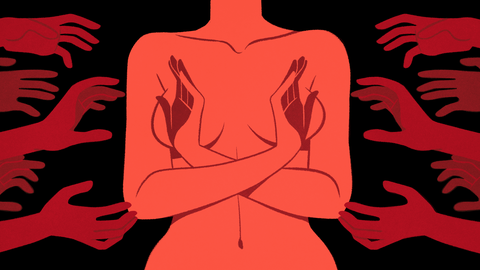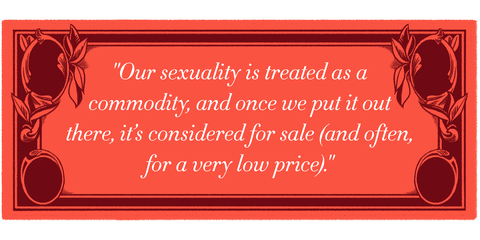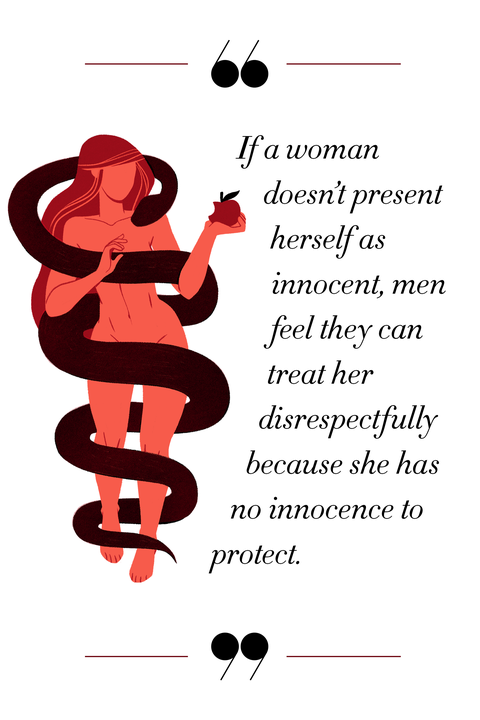Last April, I was lounging in a hot tub at a clothing-optional resort in Jamaica when a stranger sat down next to me and put his hand on my inner thigh before saying, “if you don’t mind.” (I did.) Six months later at another clothing-optional resort in the Riviera Maya, Mexico, a man walked up to me and my boyfriend, telling him (but not me) “I just have to do something” before he patted my pubic hair. And just the other day, after I tweeted about orgasm equality, a stranger slid into my DMs to say “I see from your post you like to be pleased.” He proceeded to graphically describe a sexual fantasy involving me.
All these situations have one thing in common: after I presented myself as a sexual being, I was treated like a sexual object—one that was there for men’s gratification. I was up for grabs, literally.
Simply existing is often enough for a woman to be the target of men who feel entitled to her body, but if a woman is open about her sexuality, this seems to serve as extra permission for people to do whatever they want with her. Our sexuality is treated as a commodity, and once we put it out there, it’s considered for sale (and often, for a very low price).
After author Kayt Sukel published her book, This Is Your Brain on Sex, she immediately noticed an uptick in unwanted attention. “I had a bunch of dudes send me unsolicited dick pics with notes like ‘I loved your book, let’s meet up sometime,’” she remembers. “Or if they saw the CNN piece about my orgasm in an fMRI, they’d say something about how they’d get me off better than a piece of medical equipment.” Her worst experience? The moment a long-time male friend hit on her after the book came out. “When I said, ‘No thanks,’ he got upset and said there was something deeply wrong with me that I’d get off in public but wouldn’t hook up with him.”
Similarly, Good Vibrations staff sexologist Carol Queen, PhD, says it’s common for customers to get touchy-feely with her when she’s explaining products. “We actually have to train our staff to deal with this sort of thing,” she says. “There are plenty of people who seem to think they have entered a sex candy store when they shop with us.” Queen likes to handle these situations subtly by using clinical sex terms (“nothing with fewer than three syllables”) in an attempt to desexualize the communication. “I’ll also become more protective of my personal space by backing up,” she explains. “More directly, ‘Please don’t touch me while I’m giving you information—that’s not appropriate here.’”
These stories reflect a societal script that says a man’s role is to be sexual and woman’s is to be sexy, says Lisa Wade, PhD, an associate professor of sociology at Occidental College. “We have this notion that men are the ones that feel the sexual desire and have the sexual release and women are the ones that inspire the sexual desire and offer the sexual release,” she explains. “It’s this predator-prey-type relationship.”
This is also reflected in how we learn about sex. Female desire and pleasure are so absent from sex education and the media that 44 percent of male U.S. college students can’t locate the clitoris on a diagram. Meanwhile, sexualized images of female bodies flood billboards, TV ads, and magazines. In porn, women are typically there for men’s pleasure: 78 percent of men (but only 18.3 percent of women) are depicted as orgasming in Pornhub’s 50 most popular videos.
“You see the same thing in the fact that schlubby men are married to beautiful wives in sitcoms,” says Wade. “His attractiveness is irrelevant. It’s his sexualness that’s relevant and her sexiness.”
This also means women get punished for having their own sexuality instead of just catering to men’s, with those who express strong sexual desires deemed “sluts” or “whores”, explains Queen, the Good Vibrations staff sexologist. When women are labeled this way, men may deem them unworthy of the chivalry afforded to women labeled “pure” or “innocent.”
This attitude comes from benevolent sexism—the belief that it’s men’s job to protect women (but only certain women) from inappropriate sexual behavior. If a woman doesn’t present herself as innocent, men feel they can treat her disrespectfully because she has no innocence to protect, explains Wade. “It turns into this age-old Madonna/Whore good girl/bad girl situation. The ‘good girls,’ you don’t expose them to your most brutish sexual desires.”
Afrosexology cofounder Dalychia Saah remembers learning—through a song in elementary school—that only “good girls” deserved boundaries. It went: “Girls who sit like this [legs together] get candy, girls who sit like this [legs crossed] get kisses, girls who sit like this [legs spread] get this [sexually violated].” The idea is that the harassment and assault of openly sexual women is somehow deserved can serve as a sort of punishment, explains Saah, who adds: “Identifying and treating people as objects and to sexualize and shame others are strategies used to keep people afraid of pursuing liberation and what it means to reject or redefine social scripts.”
It would be a mistake to believe that men who aggressively hit on openly sexual women are just titillated by their expressions of sexuality. Instead, Wade explains, men have been taught that they’re obligated to respond to any sexual signal a woman gives off—whether they’re turned on or not. “They’re pushed to be hypersexual, to always want it. If men are taught to think about themselves as having an on and an off switch, then as soon as a woman says ‘my switch is on,’ they don’t know how to interpret it with any nuance,” says Wade, adding: “Part of it might be a failure to help men engage with their own sexuality in a way that is caring.”
Instead of teaching women that their value lies in whether their legs are open or closed and teaching men that when a woman’s legs are open, she’s inviting them in, we need to teach everyone that the standard for a sexual interaction should be enthusiastic consent, regardless of how someone sits, behaves, speaks, or dresses. “Rape culture says a woman’s body is not her own,” notes Latisha James, Assistant Director for Prevention and Response at Spelman College. “It belongs to her parents, or her god, or her husband, or her children but never herself, and for a woman to dare and assert that her body is hers is seen as a selfish act,” says James. “Consent culture says that my body is mine, and I am the only and final authority on who gets to interact with my body and how, and that is respected no matter what.”
Dalychia and her Afrosexology co-founder Rafaella Fiallo use the Instagram and Twitter hashtag #SexualNotSexualized—created by hip-hop artist Lizzo—to remind themselves and others that a woman can be as sexual as she wants without asking to be sexualized. They also developed an Erotic Care Plan to help people connect with, and own, their own sexuality.
“It can be really easy to internalize self-blaming messages that reinforce the idea that you shouldn’t own your sexuality,” says Fiallo. “Instead, explore your sexuality, know what it means to surround yourself with things and people that bring you pleasure, and affirm that you deserve to be a sexual being.” Saah adds that even though we need to address sexism and misogyny by calling men out, “we can’t forget to affirm our pleasure in the midst of all of that.”
On the beach in Jamaica, I told another woman about the sexual harassment I’d experienced there. “Just tell them to f*ck off!” advised another woman who was listening. The next day, after a man swam up to me and pressed a vibrating rubber ducky against my breasts in the hot tub, I pushed his hand off and said, “No.” He gave me a fist-bump and swam away. Did that mean he was trying his luck—aware his behavior might be unwelcome, but of the assumption he could get away with it? I didn’t ask, because it wasn’t my job to teach him. This was about affirming my own right to choose who touches me and how—regardless of whether I’m topless.
Source: Read Full Article


